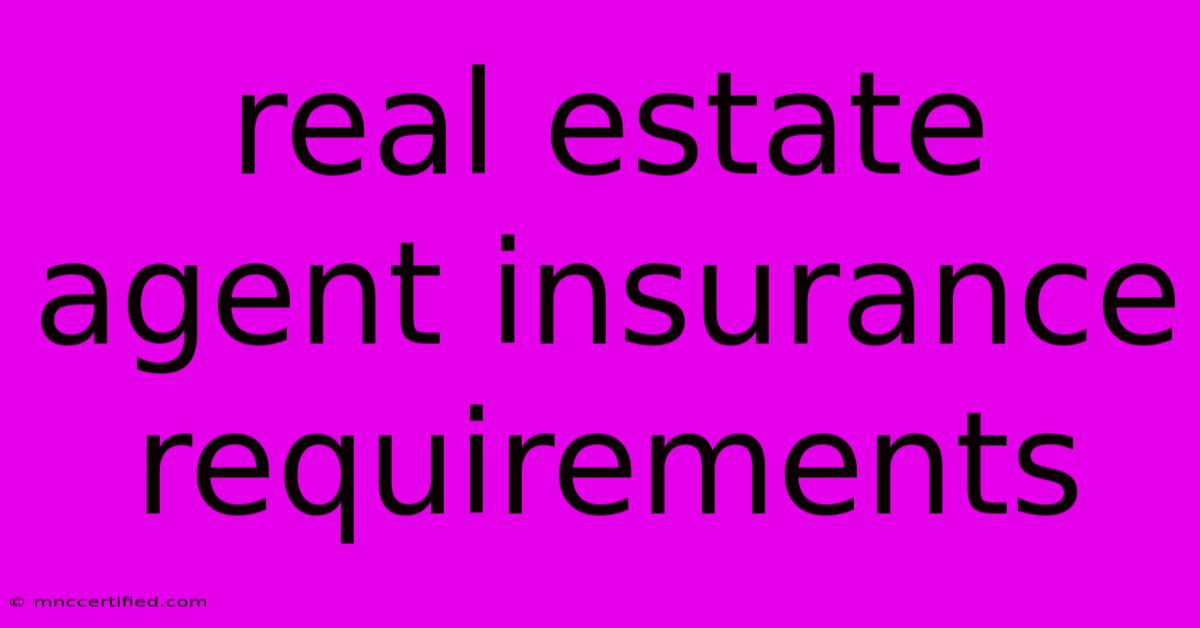Real Estate Agent Insurance Requirements

Table of Contents
Navigating the World of Real Estate Agent Insurance: What You Need to Know
Being a real estate agent is a rewarding career, but it comes with its share of risks. From property damage to liability claims, safeguarding yourself and your business is essential. Understanding the crucial insurance requirements for real estate agents can help you navigate the industry with peace of mind.
Why Real Estate Agents Need Insurance
The nature of your job exposes you to several potential liabilities, making insurance a necessity. Here are some key reasons why real estate agents should be insured:
- Property Damage: Accidental damage to a property during a showing or open house can lead to costly repairs.
- Liability Claims: Misrepresentation, negligence, or breaches of fiduciary duty can result in legal action and financial burdens.
- Errors & Omissions: Mistakes in paperwork, contract negotiation, or property disclosures can lead to claims, even if unintentional.
- Professional Reputation: Insurance protects your professional reputation and credibility in case of unforeseen incidents.
Essential Insurance Policies for Real Estate Agents
Here's a breakdown of the main types of insurance that real estate agents should consider:
1. Errors & Omissions (E&O) Insurance:
-
What It Covers: E&O insurance protects you from financial losses arising from errors, omissions, or negligent acts in your professional capacity. It covers legal defense costs and settlements for claims related to:
- Contractual Issues: Misinterpretation, incomplete information, or negligent contract drafting.
- Property Disclosures: Failure to disclose known defects or material facts about a property.
- Negligent Advice: Providing inaccurate or misleading advice to clients.
-
Why You Need It: This is arguably the most crucial insurance policy for real estate agents, offering vital protection against professional mistakes.
2. General Liability Insurance:
-
What It Covers: General liability insurance safeguards you from claims arising from bodily injury or property damage to third parties, including clients, visitors, or the public. This can include:
- Slip and Falls: Someone getting injured on your property during a showing or open house.
- Property Damage: Accidental damage to a client's belongings during a showing.
-
Why You Need It: General liability insurance provides essential protection in case of accidents or injuries that occur during your work activities.
3. Workers' Compensation Insurance (If Applicable):
-
What It Covers: If you employ assistants or have independent contractors, workers' compensation insurance is mandatory in most states. It covers medical expenses, lost wages, and disability benefits for employees who get injured or fall ill while performing their work duties.
-
Why You Need It: This policy safeguards you from financial burdens associated with employee injuries and protects your business in case of legal action.
4. Personal Umbrella Liability Insurance:
-
What It Covers: This policy extends your liability coverage beyond your existing policies, offering additional protection for claims exceeding the limits of your general liability or E&O insurance.
-
Why You Need It: An umbrella policy provides an extra layer of security, offering substantial financial protection for catastrophic events or high-value claims.
Choosing the Right Insurance Coverage
- Consult with an Insurance Broker: A qualified broker can guide you through the complexities of real estate insurance and recommend the best coverage options for your specific needs.
- Consider Your Risk Profile: The type of real estate you work with, your transaction volume, and your level of experience will influence the type of coverage you require.
- Research Different Providers: Compare quotes from several reputable insurance companies to find the most competitive rates and coverage options.
- Review Policy Details Carefully: Ensure you understand the coverage limits, deductibles, and exclusions of each policy before signing up.
Conclusion
Navigating the insurance landscape for real estate agents can seem daunting, but it's a crucial step in safeguarding your business and your personal assets. By understanding the importance of insurance, choosing the right policies, and staying informed about evolving industry standards, you can build a solid foundation for success in the competitive world of real estate.

Thank you for visiting our website wich cover about Real Estate Agent Insurance Requirements. We hope the information provided has been useful to you. Feel free to contact us if you have any questions or need further assistance. See you next time and dont miss to bookmark.
Featured Posts
-
Shetland A Fresh Start With Ashley Jensen
Nov 08, 2024
-
Coventry City Sacking Sparks Backlash
Nov 08, 2024
-
Shetland Back To Its Roots With New Lead
Nov 08, 2024
-
Shock Move Coventry City Parts Ways With Striker
Nov 08, 2024
-
Westbrook Thinks Nuggets Beat Thunder Despite
Nov 08, 2024